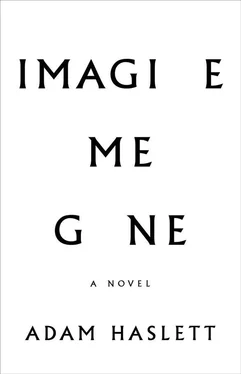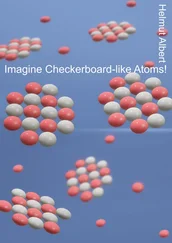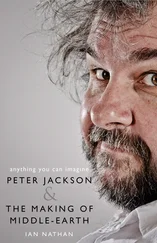By dusk it was over and Michael had set to work on the dishes. I told Paul I wanted to go for a walk and he consented. The cold air woke me almost immediately from the stupor of the house. I sensed the numbness lifting. I wanted him to put his arm around me, but he walked a few feet away. The ice on the street and the snow in the yards were blue in the fading light. There were no cars out. No sound that wasn’t absorbed by the snow. I reached over and took his gloved hand in mine.
“So what do you think?” I said. “Do you think maybe we should talk?”
“Now?” he asked.
As if my pregnancy had been suspended for the holiday.
“It is that unpleasant? Just to talk about it?”
“No,” he said, as though fending off the suggestion that he was being evasive.
Neither of us had anticipated this and we certainly hadn’t planned it. My diaphragm had always worked before. I was still adjusting to the fact myself. While I hadn’t pictured him being over the moon with excitement, I’d imagined it might be the cause for at least a bit of wonder at the prospect. At least a little speculation. Instead, it seemed he’d decided to bide his time until I announced I was having an abortion. Which wasn’t illogical. I didn’t want to stay home with a baby. He couldn’t afford to support us even if I did. There wasn’t room for a child right now, not with what we were each pursuing.
“I don’t know,” he said, slipping his hand from mine. “I guess — I mean — you haven’t said much about it. I don’t even really know what you’re thinking. Maybe I don’t want to sway you.”
“Well, saying nothing makes it seem pretty obvious what you want, doesn’t it?”
His hands were stuffed in the pockets of his peacoat, his shoulders hunched forward. In these passive moments of his, he seemed more like a third brother to me than a boyfriend. Someone to be tended. Even now, in the face of this thing affecting me so much more than him, somehow he was the subject of it all.
We kept going, through what was now nearly darkness, past the black-and-white Colonials, the little Capes hunkered in the snow, the stucco semi-mansion with its drawn shades. I almost never saw lights on here, or people out in their driveways. The neighborhood seemed an abandoned place even when populated. I would never live here again, nor anywhere like it.
I started crying. It had been like this for a couple of weeks now. Tears welling up out of nowhere and running down my cheeks, as if I were a glass filled to the brim, spilling at the slightest motion. I resented the condition: my aching breasts, the stench of food, the back pain and cramping. Paul was fretting over lost freedom in some imagined future, while my body was stealing my mind.
The waterworks brought him to my side again. He put his arm around me, and I leaned in against his chest, furious at needing him.
“I’m sorry,” he said. “I should have brought it up. It just seemed like you were ignoring it, too.”
“I can’t ignore it.”
“I know, I’m just saying, it’s not like I can really believe it’s my choice, even if I did want a kid, and maybe I do, I don’t know. But what difference would that make? I’m not the one in charge.”
“What does that mean?” I said, standing upright again, away from him.
“What choice do I have? In this, or working more again, or anything that affects our whole lives? If I love you, I have to agree with you. That’s the way it’s always been. I can see it in Alec. He’s the same way. He thinks he isn’t in control, but he’s controlling everything.”
“That’s a cop-out. It’s bullshit. You think I’m asking you to have a kid? I’m sorry I got pregnant, but I didn’t do it alone.”
“I really don’t want to fight,” he said.
“After telling me I’m controlling your whole life.” We’d stopped in the middle of the empty street, facing each other. “Were you being controlled having every morning to yourself while I went to work? Really?”
“No,” he said, “I’m grateful. I’ve told you that.”
He had that set look to his face, as if battening down the hatches for some storm of irrationality. In the last three years, being with Paul had allowed me the beginnings of sympathy for my mother. I’d always defended my father in front of her, my father who never wanted to fight. I’d defended him because he seemed weak. But was I supposed to do that again? To defend Paul from myself? All couples have arguments . That’s how Mom used to explain away her shouting. The difference being that there was no child of mine to hear this. And perhaps there never would be.
“I don’t want to argue either,” I said. “But I was sick again this morning. You’re not the only one not sleeping much right now. I haven’t told anyone about this except you. So we need to talk. And not next week, or next month.”
“I get it,” he insisted, eager, now that I had cornered him, to agree and move on.
Over his shoulder stood the mock-Tudor house my old friend Jill Brantley used to live in with her divorced mother, where she and I used to get high in the attic, like an after-school special about wayward girls and the telltale signs of delinquency. This street — this whole town — was so familiar that I looked straight through it, as if it were no longer a place unto itself but merely an opening onto the past. And holding off the tidal pull of that earlier time, preventing my getting drawn back into the house we had just left, into the family and all its repetitions, was Paul — a separate person, who had never existed here. Unimplicated. Living in the present. Aggravating and noncompliant, but attentive and affectionate, too. Who seemed to keep wanting to be with me.
“We’ll discuss it all tomorrow,” he said. “I promise. Can we be okay for now?” he said, his eyes gently pleading.
He stepped forward and hugged me, without my asking.
What choice did I have but to believe him?
As we were taking off our boots and jackets in the front hall, Alec swept by flashing widened eyes above his mask in a silent warning of drama. It turned out that Michael, in our absence, had broken down and called Bethany’s parents’ house. Her father had answered. Michael had asked to speak to Bethany. She had come to the phone and told him he was making everything worse. And then she’d told him that it was over. That they could never speak again.
“Maybe you could go up,” Mom said to me. “He’s in his room.”
“You couldn’t stop him?”
“There’s no need to shout,” she said. “We were just here reading. He used the other phone.”
We’d been in the house together, all of us, for nearly three days. I’d left for twenty minutes. Quickly absenting himself from the situation, Paul collected his novel from the coffee table and retreated to the wingback chair at the far end of the living room.
“She never did sound terribly suitable,” Aunt Penny said, standing over the fire with the iron poker.
I found Alec in the kitchen, vacuuming up a tin of chocolate chip cookies, as though we hadn’t already had two desserts.
“What?” he said. “I’m hungry.”
“So he just went up without telling anyone, and called her?”
“Basically. He was practically keening afterwards and Mom lost it, started yelling at him. Saying he was being melodramatic. She can’t handle it when he gets like that. You may have noticed this,” he said, “over the years.”
Upstairs, I listened for a moment before knocking on the door.
“Yeah?” Michael called out in a tremulous voice, as if he’d been locked in there for months, and I were the jailer come to free him.
He was sitting upright on the bed, in the dim lamplight. Crates of records that he didn’t have space for in his room at Ben’s sat in the shadowed corners. The harder up he got for money, the more Alec pressed him to sell some of his vinyl. But no matter what bills he had to pay, he couldn’t bring himself to do it. The records meant too much to him. The most valuable were the white labels and test presses of the artists who’d gone on to fame, a few with the help of Michael’s early reviews. But these in particular he held on to, especially if he thought the artists had sold out down the line. He refused to profit from what he judged to be corporate hype, as if by retaining the better work he could preserve its integrity. I didn’t blame him for this the way Alec did. I sympathized with the urge to dissent, in whatever small way, from monetizing everything. As Michael saw it, capitalism had been cruel to our father, giving him no quarter when he was down, the weight of no money and too much responsibility dragging him under. Which didn’t mean he hadn’t been sick, but that there had been no margin for being sick. I didn’t disagree. But I wished Michael could fathom how furious it made him. He seemed blind to his own anger, willfully so. On the few occasions I’d suggested as much, he’d tilted his head to one side and looked at me quizzically, as if I were describing something wholly alien.
Читать дальше












